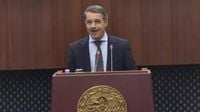In a significant announcement made on Thursday, April 25, 2025, in Algiers, Minister of Finance Abd al-Karim Bu al-Zarad revealed that the digitization of the tax sector is set to be completed within two years. This initiative aims to streamline the process for citizens to fulfill their tax obligations remotely, enhancing the efficiency of tax collection.
During a session at the National People's Assembly, which was dedicated to addressing public questions, Bu al-Zarad stated, "The strategic vision for the financial sector aims to allow the citizen to update his tax duties remotely," emphasizing that the digitization process will take approximately one and a half to two years to implement.
Addressing concerns about the limited number of local tax centers, the minister described this as a "circumstantial problem." He assured that his department is considering the establishment of new centers to alleviate the burden on citizens. Additionally, he mentioned that there is a plan to combine neighboring and state centers to expedite the processing of tax files.
On another note, Bu al-Zarad confirmed that the government is committed to supporting retirees by reducing income tax rates. Specifically, retirees earning less than 30,000 Algerian dinars are fully exempt from income tax, while those earning up to 42,000 dinars will see a reduced rate. However, he firmly denied any plans to completely exempt all retirees from income tax, deeming such a move "unreasonable" and harmful to the principle of equality among citizens, especially considering its potential impact on the national budget.
In the context of economic challenges, the minister noted that the government is actively adapting to social and economic developments, striving to support purchasing power and stabilize prices. These efforts aim to positively influence the financial situation of retirees.
Furthermore, Bu al-Zarad expressed readiness to address issues related to the construction of dual carriageway roads, particularly in areas known for high accident rates. He stated that the Ministry of Finance, in collaboration with the Ministry of Public Works, has recently formed a joint working group to tackle these pressing issues.
Shifting focus to healthcare, Dr. Muhammad Salah, head of the National Institute for Kidney Diseases and Urology, provided insights into the challenges faced by patients with kidney-related ailments. In an exclusive interview, he revealed that the institute receives approximately 300 patients daily, with an annual total exceeding 90,000 visits.
Dr. Salah detailed that the dialysis unit at the institute is equipped with 95 machines, catering to urgent cases as well as routine treatments. He explained that around 300 patients regularly undergo dialysis, averaging three sessions per week, which culminates in approximately 100,000 sessions annually.
Highlighting the diversity of kidney diseases across age groups, Dr. Salah noted that children often suffer from immunological and hereditary issues, while older adults frequently encounter complications from chronic conditions like hypertension and diabetes, which account for over 60% of kidney failure cases.
He pointed out that individuals aged between 40 and 50 are particularly susceptible to second-degree hypertension and diabetes. Additionally, kidney stones are more prevalent among those aged 20 to 30. Dr. Salah emphasized that the institute is equipped to handle all critical cases, asserting that there is currently no condition that cannot be treated at the facility.
In summary, both the Ministry of Finance and the National Institute for Kidney Diseases and Urology are undertaking significant initiatives to address pressing issues within their respective domains. The digitization of tax services aims to enhance efficiency and accessibility for citizens, while the healthcare sector is focused on providing comprehensive care for a diverse patient population.




